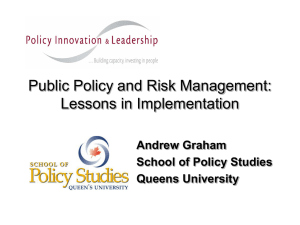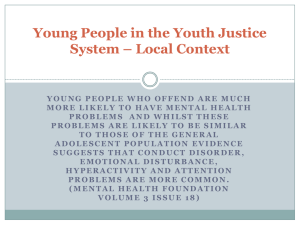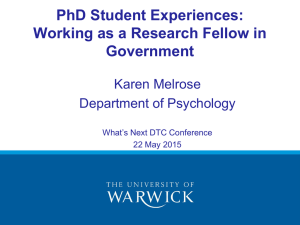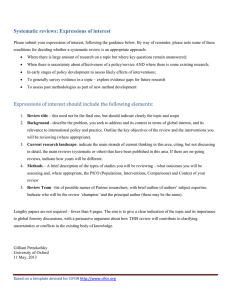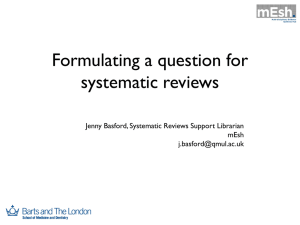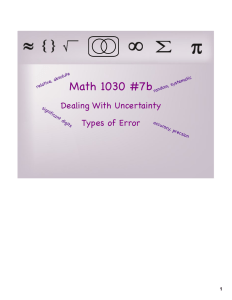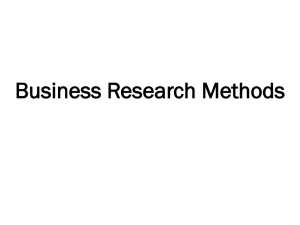Interim Academic Fellowship Report Christopher Bridle and Wolfgang Markham Title
advertisement
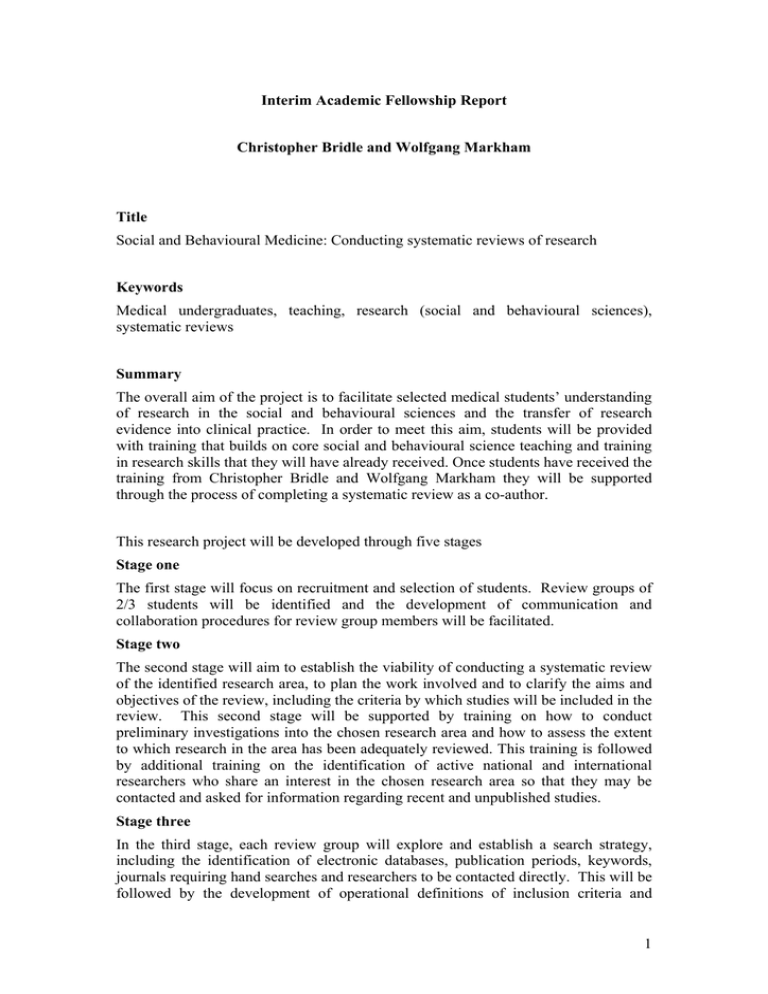
Interim Academic Fellowship Report Christopher Bridle and Wolfgang Markham Title Social and Behavioural Medicine: Conducting systematic reviews of research Keywords Medical undergraduates, teaching, research (social and behavioural sciences), systematic reviews Summary The overall aim of the project is to facilitate selected medical students’ understanding of research in the social and behavioural sciences and the transfer of research evidence into clinical practice. In order to meet this aim, students will be provided with training that builds on core social and behavioural science teaching and training in research skills that they will have already received. Once students have received the training from Christopher Bridle and Wolfgang Markham they will be supported through the process of completing a systematic review as a co-author. This research project will be developed through five stages Stage one The first stage will focus on recruitment and selection of students. Review groups of 2/3 students will be identified and the development of communication and collaboration procedures for review group members will be facilitated. Stage two The second stage will aim to establish the viability of conducting a systematic review of the identified research area, to plan the work involved and to clarify the aims and objectives of the review, including the criteria by which studies will be included in the review. This second stage will be supported by training on how to conduct preliminary investigations into the chosen research area and how to assess the extent to which research in the area has been adequately reviewed. This training is followed by additional training on the identification of active national and international researchers who share an interest in the chosen research area so that they may be contacted and asked for information regarding recent and unpublished studies. Stage three In the third stage, each review group will explore and establish a search strategy, including the identification of electronic databases, publication periods, keywords, journals requiring hand searches and researchers to be contacted directly. This will be followed by the development of operational definitions of inclusion criteria and 1 study/methodological categorisation (e.g., the types and strengths of evidence that are acceptable to the review). Search strategies will then be tested and their sensitivity and specificity evaluated (e.g. in relation to the sub-set of previously reviewed studies). Stage four In the fourth stage, each review group will conduct a search using appropriate databases and sources. Each review group will search for, identify and review relevant studies and summarise the findings for the review. They will then tabulate characteristics of each study and assess its methodological quality, select appropriate methods for combining data, analyse results of eligible studies and assemble the most complete data set feasible and, if appropriate, discuss with review group members. If appropriate and possible, each review group will also use statistical synthesis of data (meta-analysis) and perform sensitivity analysis. Stage five In the fifth stage each review group will present results in the most appropriate format for recipient audiences and prepare a structured report of the review which: • Provides background information and a rationale for the review; • states the aims and objectives; • describes materials and methods; • reports results; • makes recommendations for both research and practice. Activities Stage one work completed to date Thirty two third year medical students applied to become involved in the research. Twenty students were short listed and interviewed. Ten students were selected on the basis of the interview and every invited student agreed to take part. Short listing criteria focused on prior performance in the taught social and behavioural medicine modules that formed part of the Phase 1 curriculum primarily the Health and Disease of Populations’ module and the Human Lifespan module. All the interviews were conducted by Christopher Bridle and Wolfgang Markham. It became clear during the interviews that some of the students thought that they would find the research projects too time consuming as they were all entering their final year. As a consequence, we decided to have three rather than four review groups and each review group would be comprised of 3/4 students rather than 2/3 students as was originally planned. Two review groups were comprised of three students and one review group was comprised of four students. Stage two work completed to date One of the review groups established that one of the intended research projects focussing on school-based interventions for mental health promotion was not viable as a different review group outside of the university had recently completed this review. Three systematic reviews were chosen. 2 Review group 1 (Sarah Gray, Rachel How and Rachael Quinn) Systematic review of non-pharmacological interventions for the prevention or reduction of anxiety in young people with a diagnosis on the autistic spectrum Review group 2 (Mary Elliott, Edward Goble, Abbie Martin and Susan Ward) Systematic review of physical activity interventions on the mortality rates and quality of life of adults with a diagnosis of colon or rectal cancer. Review group 3 (Adam Borowski, Katharine Elliott and John Jones) Systematic review of cognitive behavioural therapy interventions in addition to standard pharmacological interventions for the treatment of depression in young people with a diagnosis of moderate/severe depression. Each review group has identified national and international researchers who work in the chosen field. Stage three work completed to date All three review groups have developed a search strategy, including the identification of electronic databases, publication periods, keywords, journals requiring hand searches and researchers to be contacted directly. Operational definitions of inclusion criteria and study/methodological categorisation (e.g., the types and strengths of evidence that are acceptable to the review) have been developed. Search strategies have been tested and their sensitivity and specificity evaluated (e.g. in relation to the sub-set of previously reviewed studies). Two review groups (review group 1 and review group 2) have contacted the identified researchers. Review group 3 is slightly behind because of the delay in identifying an appropriate area to conduct a systematic review. Stage four work completed to date All three review groups have conducted a search using appropriate databases and sources. Each review group has searched for, identified and reviewed relevant studies and summarised the findings for the review. The characteristics of each study have been tabulated and the methodological quality of each study has been assessed. Review group 1 has met with and are in communication with their external expert Professor Rita Jordan. Review group 2 has contacted their external expert Dr Paul Aveyard and are in the process of arranging to meet him. Review group 3 has identified Dr Moli Paul as a potential external expert but she has not been contacted to date. Each review group has analysed results of all the eligible studies and assembled the most complete data set feasible. Appropriate methods for combining data have been selected by review group 1. Review group 2 and review group 3 have still to 3 complete this task. It is likely that review group 3 will use statistical synthesis of data (meta-analysis) and perform sensitivity analysis. Stage five Review group 1 has completed a complete draft of their systematic review. Review group2 and review group 3 are yet to complete this task. How is it going so far? Both Chris and Wolf are very happy with the commitment of the students and the progress that has been made to date. The students have demonstrated a high level of skill and insight. We remain hopeful that once the systematic reviews have been completed that at least one of them will be published in an international peer reviewed journal. Issues arising The research project is not part of the formal medical undergraduate curriculum. Thus, the training required to support the completion of the project was provided by both Chris and Wolf during evening sessions that ran from 6pm until 9 pm. Every student attended the training sessions. The amount of work that students have been required to do has been exceptional. These students are due to sit their finals in May and review group 3 has decided to postpone the completion of this project until after their finals. We have agreed to support this group when they resume. We anticipate that review group 2 may also make the same decision. We are acutely aware of the predicament that some of the students are in and feel that the task may have been too onerous given that all of the students are in their final year. On the positive side however the indicated determination to complete the task either before or after their finals indicates that the participating students have found the project to be very helpful on a personal level. All the participating students have also indicated that being involved in the project has already and will continue to help them in their search for appropriate positions after they have graduated. 4
